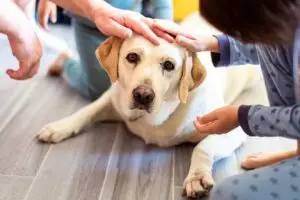Does your dog exhibit unpleasant behavior every time you leave the house? Whether it’s excessive barking, urinating, chewing on furniture or something else, these behaviors are indicative of severe anxiety. The good news is that proper dog separation anxiety training in Troy can help reduce or even eliminate these problem behaviors and help your pooch feel much more comfortable when they cannot be with you.
10 Symptoms Of Anxiety In Dogs
Separation anxiety in dogs manifests as a range of distress signals and behavioral problems when they are away from their owners or primary human companions. The intensity and form of these signs can differ, but they often include:
- Exaggerated Attachment: Dogs might display increased levels of dependency, following their owners around the house and showing signs of stress when their owner is about to leave.
- Uncontrolled Urination & Defecation: Generally well-house-trained dogs could have accidents inside the house during the absence of their owners, which is out of character for their normal behavior.
- Destructive Actions: An anxious pooch may damage furniture, gnaw on doorways, or destroy personal items, typically just after the owner leaves.
- Persistent Howling or Barking: A common sign is non-stop barking, howling, or whining, distinct in its continuity and tone from barking for other reasons.
- Frequent Escape Attempts: Your furry friend may try to escape from confined areas when left alone, potentially causing self-harm like damaged nails, broken teeth, or scraped paws.
- Unusually Enthusiastic Greetings: Upon an owner’s return, a dog with separation anxiety may exhibit greetings that are much more intense than normal.
- Compulsive Pacing: Some dogs may walk in a repetitive pattern when alone, indicating anxiety.
- Refusal to Eat: Affected pets might not eat in their owner’s absence and could even ignore treats or food.
- Excessive Salivation or Panting: These symptoms are often signs of stress and anxiety in dogs.
- Coprophagia: In more severe cases, dogs might defecate and consume their excrement due to high anxiety levels.
What Causes Separation Anxiety?
Dogs love their humans, and it can be upsetting for them to be apart, but many dogs are content to snuggle down on a dog bed and wait patiently for their humans while others cannot settle down. There are many reasons why some dogs are less able to handle being alone than others, including:
- Early Separation from Parent and Litter: Puppies taken away from their mothers and siblings prematurely are often more susceptible to separation anxiety. Dogs that have undergone frequent rehoming or extended stays in shelters are also at risk of this condition.
- Health-Related Triggers: At times, separation anxiety can stem from health issues. A dog experiencing pain or discomfort may become more anxious, especially when left alone. In such cases, addressing the underlying health problem may alleviate the need for specific behavioral training.
- Disruption in Daily Patterns: Dogs thrive on consistency, and notable shifts in their daily life, such as a family member’s departure, relocating to a new home, or a change in the owner’s work schedule, can induce separation anxiety. Dogs accustomed to continuous human presence can suffer from separation anxiety if they suddenly have to spend long periods alone.
- Loss of a Loved One: The absence (through death, moving away, etc.) of an important human in a dog’s life can cause separation anxiety, particularly if the person was the dog’s main caregiver or companion.
- Insufficient Socialization & Lack Of Training: Dogs not adequately socialized or trained to be comfortable by themselves might show symptoms of separation anxiety. This is a huge part of dog separation anxiety training in Troy, aiming to help dogs become comfortable being alone.
- Stressful Past Experiences: Events like getting lost or shelter stays can be distressing and may lead to separation anxiety in dogs.
- Inherent Anxiety Tendencies: Certain dog breeds or individuals might naturally be more prone to anxiety disorders, including separation anxiety. Our extensive experience with over 130 dog breeds aids in understanding the unique traits of various breeds.
- Dependency Issues: Dogs that haven’t learned to be independent or have been encouraged in their clingy behavior are likely to develop separation anxiety.
- Senior Dogs & Anxiety: Older dogs may start showing signs of separation anxiety, often linked to age-related cognitive decline or confusion.
A Look At Our Separation Anxiety Dog Training
Dog separation anxiety training can be an excellent way to alleviate issues related to anxiety. Basically, what we provide for anxious dogs is what is known as behavior modification dog training in Troy. We identify the root causes of the anxiety, if possible, and then develop a plan to help reduce your dog’s fears.
The first step with our dog training in Troy will be to schedule one of our introductory lessons, which costs just $1. During this lesson, a professional dog trainer will come to your home and spend some time working with your dog to get a sense of their personality. We also sit down and talk with you to discuss all of the issues you would like resolved, from anxiety-related problems to obedience training and even aggression, if that is an issue.
Once the trainer has completed this lesson, a training plan will be developed. We create custom training plans for each of our dogs because all dogs are unique and a training method that works with one canine might not work with another.
We offer two options for training, and we will let you know which option we recommend for your dog. We can provide you with an in-home dog trainer in Troy or, for more intensive training, you can opt for our dog boot camp in Troy. This is a board-and-train program where your dog lives with one of our trainers for several weeks. The doggy boot camp in Troy is the best option for dogs with severe issues, such as aggression.
Of course, while you might be calling us for help with separation anxiety, we can address other issues, as well. We teach all of the basic obedience skills (sit, stay, come here, etc.) as well as teaching dogs to walk properly on a leash and to curb behaviors such as excessive barking, jumping and all types of dog aggression.
Once your in-home lessons or boot camp is complete, most of our Tip Top K9 dog training packages also include lifetime group classes and lifetime phone support. Our goal is to provide you with training that lasts a lifetime, so don’t forget to take advantage of this extra level of support, which can reinforce positive behavior.
Book Your First Lesson Today!
If you are interested in our dog separation anxiety training in Troy, or any type of expert dog training in Troy, the team at Tip Top K9 is here to help. To book your $1 first lesson, just click on the Schedule Lesson tab on our homepage. In addition to training dogs in Troy, we also serve Birmingham, Madison Heights and the surrounding areas.



